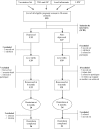The impact of perinatal depression on exclusive breastfeeding: a cohort study
- PMID: 25682731
- PMCID: PMC6860115
- DOI: 10.1111/mcn.12170
The impact of perinatal depression on exclusive breastfeeding: a cohort study
Abstract
Perinatal depression is associated with infant undernutrition. We hypothesised that perinatal depression was associated with early cessation of exclusive breastfeeding and reduced quantity of breast milk in rural Pakistan. We used a prospective cohort design to study a population-based sample of 132 depressed and 147 non-depressed women from the third trimester of pregnancy to 6 months post-natal. Current major depressive episode was measured in the third trimester and 6 months post-natal using the Structured Clinical Interview for DSM-IV Diagnosis. In a convenience sample of 24 depressed and 31 non-depressed exclusively breastfeeding mothers, breast milk quantity was assessed (mL kg(-1) infant weight per 24 h) at 4 months using the dose-to-mother deuterium dilution method. We administered also the Perception of Insufficient Milk questionnaire at 6 months post-natal. Depression was associated with fewer days of exclusive breastfeeding (91.8 (SD = 47.1) vs. 108.7 days (SD = 54.3) (95% CI: 3.4 to 30.3 P = 0.014). Women with persistent depression ceased exclusive breastfeed earliest. There was no difference in the quantity of breast milk produced by depressed and non-depressed mothers: 89.3 (SD = 38.1) vs. 83.9 (29.0) ml/kg infant wt/24 hours, P = 0.57. Depressed mothers were significantly more likely to report insufficient milk: PIM scores were 34.4 (SD = 14.3) for depressed and 39.7 (SD = 10.4) for non-depressed women (P = 0.004). In Cox regression PIM score mediated the association between depression and early cessation of breastfeeding. In this area of rural Pakistan, perinatal depression is associated with early cessation of exclusive breastfeeding and this is associated with mothers' perceptions of insufficiency of breast milk but not reduced milk production.
Keywords: breast milk; breastfeeding; deuterium dilution method; exclusive breastfeeding; maternal depression; perinatal depression.
© 2015 John Wiley & Sons Ltd.
Conflict of interest statement
The authors declare that they have no conflicts of interest.
Figures
Similar articles
-
The relationship between perceived milk supply and exclusive breastfeeding during the first six months postpartum: a cross-sectional study.Int Breastfeed J. 2020 Jul 17;15(1):65. doi: 10.1186/s13006-020-00310-y. Int Breastfeed J. 2020. PMID: 32680551 Free PMC article.
-
Breastfeeding practices of Cameroonian mothers determined by dietary recall since birth and the dose-to-the-mother deuterium-oxide turnover technique.Matern Child Nutr. 2012 Jul;8(3):330-9. doi: 10.1111/j.1740-8709.2011.00293.x. Epub 2011 Mar 22. Matern Child Nutr. 2012. PMID: 21426489 Free PMC article.
-
Predictors of exclusive breastfeeding in early infancy: operational implications.Indian Pediatr. 1995 Dec;32(12):1287-96. Indian Pediatr. 1995. PMID: 8772886
-
Maternal perceptions of insufficient milk supply in breastfeeding.J Nurs Scholarsh. 2008;40(4):355-63. doi: 10.1111/j.1547-5069.2008.00234.x. J Nurs Scholarsh. 2008. PMID: 19094151 Free PMC article. Review.
-
Maternal Psychological Distress and Lactation and Breastfeeding Outcomes: a Narrative Review.Clin Ther. 2022 Feb;44(2):215-227. doi: 10.1016/j.clinthera.2021.11.007. Epub 2021 Dec 20. Clin Ther. 2022. PMID: 34937662 Free PMC article. Review.
Cited by
-
Saccharomyces cerevisiae Yeast-Based Supplementation as a Galactagogue in Breastfeeding Women? A Review of Evidence from Animal and Human Studies.Nutrients. 2021 Feb 25;13(3):727. doi: 10.3390/nu13030727. Nutrients. 2021. PMID: 33668808 Free PMC article. Review.
-
Chronic Maternal Depressive Symptoms Are Associated With Reduced Socio-Emotional Development in Children at 2 Years of Age: Analysis of Data From an Intervention Cohort in Rural Pakistan.Front Psychiatry. 2019 Nov 20;10:859. doi: 10.3389/fpsyt.2019.00859. eCollection 2019. Front Psychiatry. 2019. PMID: 31824356 Free PMC article.
-
Nutritional and Non-nutritional Composition of Human Milk Is Modulated by Maternal, Infant, and Methodological Factors.Front Nutr. 2020 Sep 16;7:576133. doi: 10.3389/fnut.2020.576133. eCollection 2020. Front Nutr. 2020. PMID: 33117843 Free PMC article. Review.
-
Expanding Access to Perinatal Depression Treatment in Kenya Through Automated Psychological Support: Development and Usability Study.JMIR Form Res. 2020 Oct 5;4(10):e17895. doi: 10.2196/17895. JMIR Form Res. 2020. PMID: 33016883 Free PMC article.
-
Opportunities and obstacles to screening for perinatal depression among women in Zimbabwe: A narrative review of literature.S Afr J Psychiatr. 2018 Aug 28;24:1127. doi: 10.4102/sajpsychiatry.v24i0.1127. eCollection 2018. S Afr J Psychiatr. 2018. PMID: 30263213 Free PMC article.
References
-
- Agha A., White F., Younus M., Kadir M.M., Ali S. & Fatmi Z. (2007) Eight key household practices of Integrated management of childhood illnesses (IMCI) amongst mothers of children 6 to 59 months in Gambat, Sindh, Pakistan. The Journal of the Pakistan Medical Association 57, 288–293. - PubMed
-
- Bhutta Z.A., Thaver D., Akram D.S. & Khan M. (2004) A situation and program analysis of malnutrition among women and children in Pakistan: can we break the time warp? In: Maternal and Child Health in Pakistan: Challenges and Opportunities (ed. Bhutta Z.A.), pp. 151–172. Oxford University Press: Oxford.
-
- Coward W.A., Cole T.J., Sawyer M.B. & Prentice A.M. (1982) Breast milk intake measurement in mixed fed infants by administration of deuterium oxide to their mothers. Human Nutrition. Clinical Nutrition 36, 141–148. - PubMed
-
- Dennis C.L. (2002) Breastfeeding initiation and duration: a 1990–2000 literature review. Journal of Obstetric, Gynecologic, and Neonatal Nursing 31 (1), 12–32. - PubMed
Publication types
MeSH terms
LinkOut - more resources
Full Text Sources
Other Literature Sources
Medical


